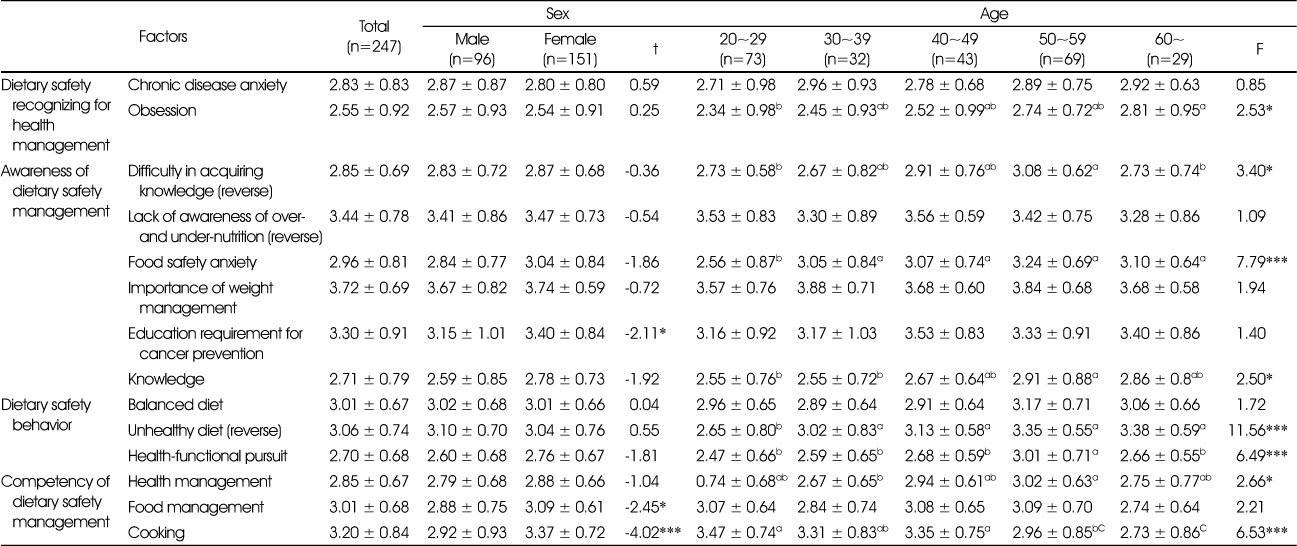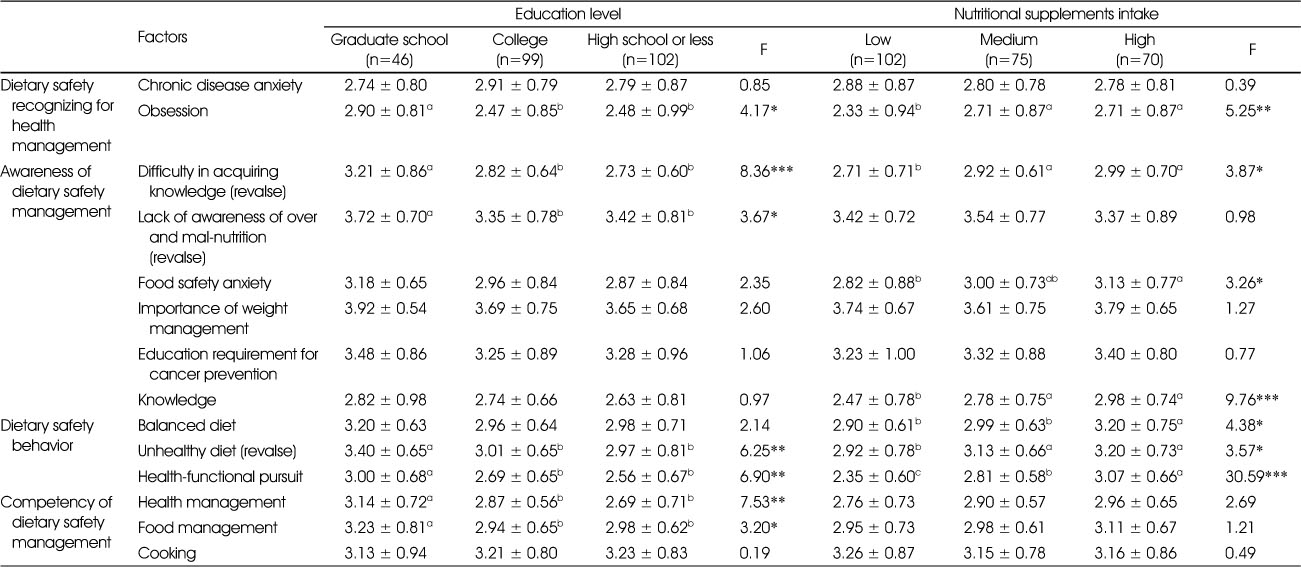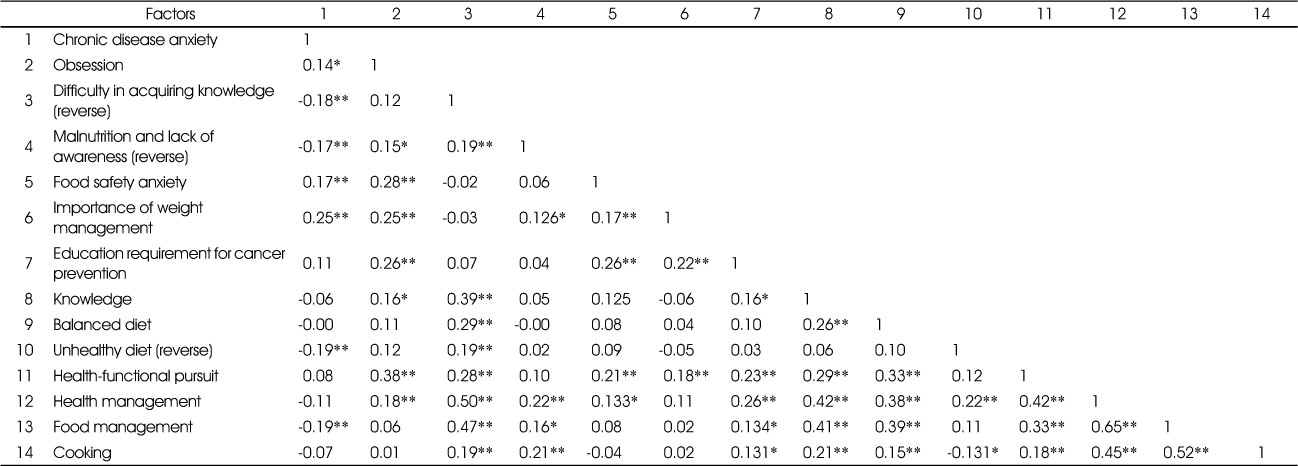Articles
- Page Path
- HOME > Korean J Community Nutr > Volume 25(2); 2020 > Article
- Research Article
- Dietary Safety Management Awareness and Competency for Healthcare among Adults in Daegu and Gyeongbuk Areas
- Yunhwa Kim
-
Korean Journal of Community Nutrition 2020;25(2):112-125.
DOI: https://doi.org/10.5720/kjcn.2020.25.2.112
Published online: April 30, 2020

-
Corresponding author:
Yunhwa Kim,
Email: yunhwa47@hanmail.net
- 972 Views
- 7 Download
- 6 Crossref
- 0 Scopus
Abstract
Objectives
Diet and incidence of chronic diseases are highly related. This study examined the characteristics of dietary safety awareness and competency for chronic disease prevention among adults.
Methods
Data were collected from 247 adults in Daegu and Gyeongbuk areas using a self-administered questionnaire in May and June of 2018. Data were analyzed by frequency analysis, χ 2-test, factor analysis, reliability analysis, t-test, one-way analysis of variances, and correlation.
Results
The results of the factor analysis indicate that dietary safety awareness of health management was classified into chronic disease anxiety and obsession. Awareness of dietary safety management was sub-grouped into difficulty in acquiring knowledge, lack of awareness of over and malnutrition, food safety anxiety, importance of weight management, education requirement for cancer prevention, and knowledge. Dietary safety behavior composed of a balanced diet, unhealthy diet, and healthfunctional pursuit. Dietary safety management competency was comprised of health management, food management, and cooking. The competency scores of dietary safety management factors were significantly different according to sex, age, and education level (P < 0.05). Balanced diet factor was significantly correlated with knowledge, health-functional pursuit, health management, food management, and cooking capacity factors (P < 0.01).
Conclusions
Active education for dietary safety management competency according to age, gender, and education level should provide dietary safety education to reduce anxiety and obsession regarding chronic diseases and sustainable health management.
Published online Apr 30, 2020.
https://doi.org/10.5720/kjcn.2020.25.2.112
Dietary Safety Management Awareness and Competency for Healthcare among Adults in Daegu and Gyeongbuk Areas
Abstract
Objectives
Diet and incidence of chronic diseases are highly related. This study examined the characteristics of dietary safety awareness and competency for chronic disease prevention among adults.
Methods
Data were collected from 247 adults in Daegu and Gyeongbuk areas using a self-administered questionnaire in May and June of 2018. Data were analyzed by frequency analysis, χ2-test, factor analysis, reliability analysis, t-test, one-way analysis of variances, and correlation.
Results
The results of the factor analysis indicate that dietary safety awareness of health management was classified into chronic disease anxiety and obsession. Awareness of dietary safety management was sub-grouped into difficulty in acquiring knowledge, lack of awareness of over and malnutrition, food safety anxiety, importance of weight management, education requirement for cancer prevention, and knowledge. Dietary safety behavior composed of a balanced diet, unhealthy diet, and health-functional pursuit. Dietary safety management competency was comprised of health management, food management, and cooking. The competency scores of dietary safety management factors were significantly different according to sex, age, and education level (P < 0.05). Balanced diet factor was significantly correlated with knowledge, health-functional pursuit, health management, food management, and cooking capacity factors (P < 0.01).
Conclusions
Active education for dietary safety management competency according to age, gender, and education level should provide dietary safety education to reduce anxiety and obsession regarding chronic diseases and sustainable health management.
Table 1
General information according to nutrition supplements intake
Table 2
Factor analysis of dietary safety recognizing for health management
Table 3
Factors analysis of dietary safety management awareness
Table 4
Factor analysis of dietary safety behavior
Table 5
Factor analysis of dietary safety management competency
Table 6
Mean of dietary safety management factors according to gender and age
Table 7
Mean of dietary safety management factors according to education levels and nutritional supplements intake
Table 8
Correlation between dietary safety management factors
References
-
Maslow AH. In: Motivation and personality. 2nd ed. New York: Harper & Row; 1970. pp. 19-58.
-
-
Chung W. Achievements and future tasks of the Korea police activities for harmful food elimination. J Korean Public Police Secur Stud 2016;13(1):233–256.
-
-
Ministry of Health and Welfare, Korea Centers for Disease Control and Prevention. Korea Health Statistics 2016: Korea National Health and Nutrition Examination Survey (KNHANES VII-1). Cheongju: Korea Centers for Disease Control and Prevention; 2017.
-
-
Lee JS, Kim HY, Hwang JY, Kwon SH, Chung HR, Kwak TK. Development of nutrition quotient for Korean adults: item selection and validation of factor structure. J Nutr Health 2018;51(4):340–356.
-
-
World Health Organization. Diet, nutrition and the prevention of chronic diseases. Geneva: WHO Technical Report Series; 2003. pp. 160.
-
-
Statistics Korea. Cause of death statistics 2018 [internet]. 2018 [updated 2019 Sep 24]. [cited 2019 Dec 29].Available from: http://kostat.go.kr/portal/korea/kor_
nw/1/6/2/index.board?bmode=read&bSeq=&aSeq=377606&pageNo=1&rowNum=10&navCount=10&currPg=&searchInfo=&sTarget=title&sTxt=.
-
-
Kwon JS, Kim KM, Seo HC, Lee YN, Lim SG, Choi YS. A study on dietary behaviors, health-related lifestyle of adult visitors at public health centers in Gyeonggi urban area. Korean J Community Nutr 2013;18(6):611–625.
-
-
Lee MS, Kwak CS. The comparison in daily intake of nutrients, quality of diets and dietary habits between male and female college students in Daejeon. Korean J Community Nutr 2006;11(1):39–51.
-
-
Kwak CS, Lee JW, Hyun WJ. The effects of smoking and alcohol drinking on nutritional status and eating habits in adult male. Korean J Community Nutr 2000;5(2):161–171.
-
-
Choi M, Kim MH. A study on bone mineral density, dietary habits and nutritional status of adult women in the three age groups. Korean J Food Cult 2007;22(6):833–840.
-
-
Yim KS. Nutrient intake assessment of Korean elderly living in Inje area, according to food group intake frequency. Korean J Food Cult 2008;23(6):779–792.
-
-
Ministry of Health and Welfare, Korea Centers for Disease Control and Prevention. 2017 National health statistics national health and nutrition survey, 7th Year [internet]. KCDC; 2018 [cited 2019 Dec 30].Available from: https://knhanes.cdc.go.kr/knhanes/sub04/sub04_
03.do?classType=7.
-
-
National Cancer Information Center. Cancer incidence [internet]. 2019 [updated 2019 Sep 24]. [cited 2019 Dec 29].Available from: https://www.cancer.go.kr/lay1/S1T639C640/contents.do.
-
-
National Cancer Information Center. Common causes of cancer [internet]. National Cancer Information Center; 2019 [cited 2019 Oct 14].Available from: https://www.cancer.go.kr/lay1/S1T200C202/contents.do.
-
-
Yoo YG, Park YR, Choi EH. A comparative study of life styles between lung cancer patients and healthy adults. Asian Oncol Nurs 2013;13(3):136–144.
-
-
Kelly K. An overview of how to nourish the cancer patient by mouth. Cancer 1986;58(S8):1897–1901.
-
-
Lee YJ, Kang MJ, Paik HY, Song YJ. Use of dietary supplements and determinants of taking dietary supplements by gender in the Korean population: Using the 4th Korean national health and nutrition examination survey (2007-2009). Korean J Community Nutr 2017;22(4):347–355.
-
-
Nam SM, Cho IH. High rate of nutritional supplements usage and side effects among middle·high school and college swimmers and their low level of safety knowledge. Korean J Sport 2019;17(1):531–542.
-
-
Center for Disease Control and Prevention. Youth risk behavior surveillance-United State. MMWR 1995;45(SS-4):1–86.
-
-
Park HS, Kwon SJ. The differences in the knowledge of cancer causes, and preventive health behaviors of college students. Korean Assoc Secur Saf 2012;8(1):85–104.
-
-
Kim GY, Park MO. Effects of the dietary consciousness on intake frequency of foods by gender and generations. J East Asian Soc Dietary Life 2014;24(4):503–513.
-
-
Ministry for Health, Welfare and Family Affairs, The Korean Nutrition Society. Dietary guidelines for Korean adults. Seoul: Ministry for Health, Welfare and Family Affairs; 2009.
-
-
Kim WY, Cho MS, Lee HS. Development and validation of mini dietary assessment index for Koreans. Korean J Nutr 2003;36(1):83–92.
-
-
Shim JE, Paik HY, Lee SY, Moon HK, Kim YO. Comparative analysis and evaluation of dietary intake of Koreans by age groups: the Korean Diet Quality Index. Korean J Nutr 2002;35(5):558–570.
-
-
Park YS, Han JL, Lee JW, Cho HS, Koo J, Kim JH. The development of a simple evaluation questionnaire for screening the overweight-type dietary pattern in 30 to 49 year old adults. Korean J Community Nutr 2002;7(4):495–505.
-
-
Korea Health Industry Development Institute (KHIDI). D-HRA: diet related health risk appraisal [Internet]. Korea Health Industry Development Institute; 2016 [cited 2019 Jul 3].Available from: https://www.khidi.or.kr/dhra.
-
-
Kang MH, Lee JS, Kim HY, Kwon S, Choi YS, Chung HR. Selecting items of a food behavior checklist for the development of nutrition quotient (NQ) for children. Korean J Nutr 2012;45(4):372–389.
-
-
Kim HY, Kwon S, Lee JS, Choi YS, Chung HR, Kwak TK. Development of a nutrition quotient (NQ) equation modeling for children and the evaluation of its construct validity. Korean J Nutr 2012;45(4):390–399.
-
-
Kim JR, Lim HS. Relationships between children's nutrition quotient and the practice of the dietary guidelines of elementary school students and their mothers. J Nutr Health 2015;48(1):58–70.
-
-
Yoo JS, Choi YS. Evaluation of items for the food behavior checklist and nutrition quotient score on children in rural areas of Gyeongbuk. J Nutr Health 2013;46(5):427–439.
-
-
Boo MN, Cho SK, Park K. Evaluation of dietary behavior and nutritional status of elementary school students in Jeju using nutrition quotient. J Nutr Health 2015;48(4):335–343.
-
-
Lee SJ, Kim Y. Evaluation of the diet and nutritional states of elementary and middle school students in the Daegu area by using nutrition quotient for children. J Nutr Health 2013;46(5):440–446.
-
-
Huang YC, Kim HY. Assessment of dietary behavior of Chinese children using nutrition quotient for children. J Nutr Health 2014;47(5):342–350.
-
-
Yook SM, Park S, Moon HK, Kim K, Shim JE, Hwang JY. Development of Korean healthy eating index for adults using the Korea national health and nutrition examination survey data. J Nutr Health 2015;48(5):419–428.
-
-
Lee KA. Pre-service elementary school teachers' eating habits, and their perceptions of eating traditional Korean foods, based on the health belief model. J Korean Pract Arts Educ 2014;27(1):45–65.
-
-
Yoo HJ, Joo SH. A structural equation analysis on consumers' perceived food safety and food safety orientation behavior. Consum Policy Educ Rev 2012;8(4):49–70.
-
-
Kim YH. Adulterated food management amongst food sellers near the schools in Daegu and Gyeongbuk provinces. Korean J Food Cook Sci 2016;32(6):762–772.
-
-
Kim JW, Lee EJ. Evaluation of dietary habits and dietary life competency of elementary school students. J Korean Pract Arts Educ 2014;27(4):17–37.
-
-
Kim YH. Awareness of adulterated food and its management beliefs and capabilities among teenagers' parents. Culin Sci Hosp Res 2018;24(2):223–233.
-
-
Jang MK, Her ES, Lee KH. Metabolic syndrome risk by intake ratio and intake pattern of proteins in middle-aged men based on the 2012-2013 Korean national health and nutrition examination survey data. Korean J Community Nutr 2016;21(4):366–377.
-
-
Vucenik I, Stains JP. Obesity and cancer risk: evidence, mechanisms, and recommendations. Ann NY Acad Sci 2012;1271(1):37–43.
-
-
Korean Statistical Information Service. 5-year cancer prevalence, 24 cancer types/sex/age (5 years old) [internet]. Korean Statistical Information Service; 2019 [cited 2020 Jan 3].Available from: http://kosis.kr/statisticsList/statisticsListIndex.do?menuId=M_
01_ 01&vwcd=MT_ ZTITLE&parmTabId=M_ 01_ 01#SelectStatsBoxDiv.
-
-
Lin HB, Lee SS. A study of Korean consumers on dietary satisfaction to sentiment index about food safety: Focusing on moderating effects of reliance to food safety information. J Korean Home Manag Assoc 2016;34(3):15–26.
-
-
Baek SS, Cho HY. Influence of health promotion behaviors and anxiety on adaptation to college life in undergraduate student. J Korean Soc Wellness 2018;13(3):103–112.
-

 KSCN
KSCN









 Cite
Cite


